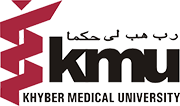Inaugural ceremony Of 3 days 9th Annual Health research conference
Vice Chancellor National University of Medical Sciences, Rawalpindi, Lt. General Prof. Dr. Syed Muhammad Imran Majeed has said that generation of new knowledge, transference of that knowledge to others and translation of that knowledge into practice are the three basic functions of a modern era university. All these three core functions, intertwined with demand driven human resource production, under the umbrella of the core human values such as ethics, transparency, and honesty is the ideal for universities in the developing countries like Pakistan. We should be targeting local solutions for our local problems, through a thriving research enterprise, he was talking as chief guest to the inaugural session of three days 9th annual health research conference organized by KMU with the theme of “Health Research Priorities in the SGD’s era”. Besides others eminent health professionals former principal Khyber Medical College, Peshawar Prof. Dr. Nasir uddin Azam Khan, Vice Chancellor Kushal Khan Khattak University (KKKU), Karak, Prof. Dr. Jehan Bakht, Technical Officer WHO-EMRO Prof. Dr. Gohar Wajid and Prof. Dr. Arshad Javed were also present at the occasion.
Lt. General Prof. Dr. Syed Imran Majeed said being a medical university; KMU should have to shoulder double burden i.e to consolidate on what was built and then to translate that work into societal and public health impact. He hoped that KMU will take its stewardship responsibility and drive health research forward in the KP province, as KP has the rich human resources. As a guardian and facilitator of research in the province, hopefully KMU will take a lead in identifying the research priorities and recommendations of this conference will be implemented in true national spirit at all levels, he added.
While talking to the inaugural ceremony on the topic of Technical Officer WHO-EMRO Prof. Dr. Gohar Wajid said, according to WHO in EMRO region, Pakistan had the lowest nurses and midwives ratio against doctor with 0.50. He said that data available with PMDC shows that in Pakistan the density of doctors / 1000 population ranges to 0.98 while density per 1000 population of nurses and community based health workers is 0.50 which is more alarming for better health delivery system. He said feminization of physicians is a real challenge to the policy makers as well as medical regulatory bodies like PMDC and medical universities. He mentioned that average increase in the number of male and female doctors per year since 1980 upto 2017 is reached from 2810 and 976 to 5313 and 5008 in male and female doctors respectively. He urged the relevant quarters for more investment in scaling up health work force by strengthening primary care and to introduce incentives for deployment, retention and better utilization of health force. Former principal KMC Prof. Dr. Nasir uddin Azam Khan, VC KKKU Karak Prof. Dr. Jehan Bakht, Prof. Dr. Arshad Javed and Director KMU-ORIC Dr. Zohaib Khan also talked to the conference.
